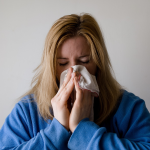Getting an appointment to see your doctor is, often, only part of the battle. Although telemedicine has reduced the overall need, for many, we still have the need and expense of getting to your doctor’s office. Leaving aside the time and money lost in transit, there are real costs for transportation, especially if you are seeing physicians frequently, e.g., undergoing chemotherapy or radiation therapy.
Disease
A recent study found that marijuana smoke may cause emphysema. The problem? The study was complete garbage. Celebrities and social-media "influencers" are hyping the weight-loss benefits of repurposed diabetes drugs. Should these medicines really be used to slim down? It's complicated.
Upper respiratory infections have a seasonality; winter is their thing. The role of the changing temperature and humidity, in some entangled manner, contributes to the winter increases. But what is the role of one of our first barriers to those invading microbes, the nose?
A disease produces specific signs or symptoms. Symptoms are reported by patients and are largely subjective, while signs are elicited by physicians and have a more objective quality. Meanwhile, a syndrome is a set of symptoms suggesting the presence of an underlying disease or condition. And while COVID is a disease, long COVID remains an often-ill-defined syndrome.
“In a new analysis of medical records, cannabis smokers had higher rates of a certain type of emphysema than tobacco smokers.” It's another attention-grabbing headline that fails to tell the whole story. Let’s skip the public relations version and consider the study's findings.
Ozempic, a drug indicated for Type II diabetes, has become the latest weight-loss darling. Not since ivermectin has a drug gained so much interest from its off-label uses. Let’s take a deeper look at the science and a regulatory conundrum.
The short answer to this question is: If we consider monozygotic (identical) twins, then it's a firm somewhat. A new study looks at the impact of differing leisure time physical activity and twins' health.
"It can disappear in a moment," Dr. Chuck Dinerstein said after his near-fatal battle with a pulmonary embolism. How should our mortality influence our worldviews? Unregulated medical devices may put patients in harm's way. Why is the Cleveland Clinic parroting anti-vaping talking points from the Truth Initiative?
The Clean Air Act of 1970 and subsequent Amendments have long been interpreted as applying only to outdoor air. But most of us spend up to 85% of our time indoors – especially the very young and old- more susceptible to air pollution’s health effects. Should we care about this?
To what degree does a patient’s belief that treatment will succeed influence care outcome? Can a study of treating appendicitis with antibiotics shed some light on the role of faith in our care?
You can’t miss the headlines. As we enter the fall, we now face the combined forces of influenza, COVID, and RSV – respiratory syncytial virus. Are the continued drumbeats of fear necessary?
I was supportive when governmental institutions told me to social distance and mask up. I bristle when they tell me that there should be no medical or surgical management for gender dysphoria for those under 18, even with parental consent. The science for both is unclear and unsettled. Are my feelings driven by politics or something else?











